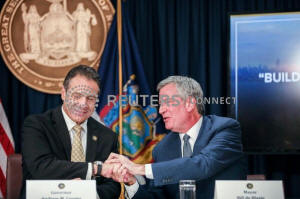|
Manhattan drivers may soon face
congestion fee to pay for subway fix
 Send a link to a friend
Send a link to a friend
 [February 27, 2019]
By Jonathan Allen [February 27, 2019]
By Jonathan Allen
NEW YORK (Reuters) - Drivers entering the
most congested part of Manhattan would have to pay a charge to help fund
repairs to New York City's deteriorating subway system under a plan
announced on Tuesday by Mayor Bill de Blasio and New York Governor
Andrew Cuomo.
If the plan is adopted, New York may become the first major U.S. city to
follow the lead of London, which began levying a congestion charge on
vehicles driving into the city center in 2003, and a handful of other
international cities.
Cuomo has long favored the new toll to generate revenue for an aging
subway system that has been plagued by delays and closures. The mayor,
who had favored raising taxes on the wealthiest New Yorkers rather than
congestion pricing, said he was dropping his opposition.
"I still believe a millionaires tax provides the best, most sustainable
revenue source for the transit improvements our city needs," de Blasio
said in a statement. "But the time to act is running out, and among all
alternatives, congestion pricing has the greatest prospects for
immediate success."

Under the plan, which requires approval from the state legislature, most
people who drive into Manhattan below 61st Street, or roughly everywhere
south of Central Park, will have to pay a toll. The toll amounts are to
be set by the end of the year.
"It's a luxury to drive into Manhattan," Cuomo said in a radio interview
with WNYC on Tuesday, noting that most vehicles filling Manhattan each
day drove in from another state.
Both Cuomo and de Blasio have said the city's subway system, one of the
world's busiest, is in a crisis as the Metropolitan Transportation
Authority, the state agency that runs the system, struggles to find
funding to fix aging infrastructure.
LATE TRAINS, CROWDED CARS AND ANCIENT SIGNALS
About a third of trains run late. Decades-old signals require large gaps
between trains, leading to commuters struggling to squeeze into crowded
railway cars at rush hour.
The MTA estimates that it needs between $41 billion and $60 billion to
pay for improvements and repairs under its next five-year capital plan
that begins next year, on top of its roughly $17 billion annual
operating budget.
A working group created by the state legislature last year recommended
congestion pricing, saying it could generate $1 billion or more a year.
The revenue would support at least $15 billion in bonded financing over
the next decade, the group said.
[to top of second column]
|

New York Governor Andrew Cuomo and New York Mayor Bill de Blasio
speak during a news conference about Amazon's headquarters expansion
to Long Island City in the Queens borough of New York, in New York,
U.S., November 13, 2018. REUTERS/Jeenah Moon/File Photo

Drivers unhappy at the new toll could take consolation in estimates
that traffic would move 20 percent faster than the current average
of 7.1 miles per hour (11.4 kph) under the plan, the working group
said.
Officials in Los Angeles, San Francisco and Seattle have also
discussed congestion pricing, a system that succeeded in reducing
air pollution and traffic in London, which currently charges drivers
£11.50 ($15.24) per day during weekday business hours.
Transit advocacy groups welcomed the proposal, saying the mayor's
relenting was an important step forward.
"It's not a silver bullet to fixing the current crisis, but it
raises a significant amount of money," Jaqi Cohen, the campaign
coordinator at the New York commuter advocacy group the Straphangers
Campaign, said in a telephone interview.
Cuomo promised additional new revenue would come from a tax on
cannabis as he moves to legalize it in the state.
The governor and the mayor said they expected reduced tolls during
off-peak hours, and exemptions for vehicles driven by or
transporting people with disabilities, among other categories.
The FDR Drive, the main highway tracing Manhattan's east side and a
primary thoroughfare connecting the island to the city's outer
boroughs, will also not carry a toll.

Taxis and other for-hire vehicles, which have been subject to a
congestion surcharge of up to $2.75 for each ride in much of
Manhattan since January, would not have to pay the additional
congestion toll under Cuomo's plan. The proposed exemption and
others, however, are subject to negotiation with state lawmakers.
(Reporting by Jonathan Allen in New York; Editing by Frank McGurty
and Bill Berkrot)
[© 2019 Thomson Reuters. All rights
reserved.]
Copyright 2019 Reuters. All rights reserved. This material may not be published,
broadcast, rewritten or redistributed.
Thompson Reuters is solely responsible for this content. |